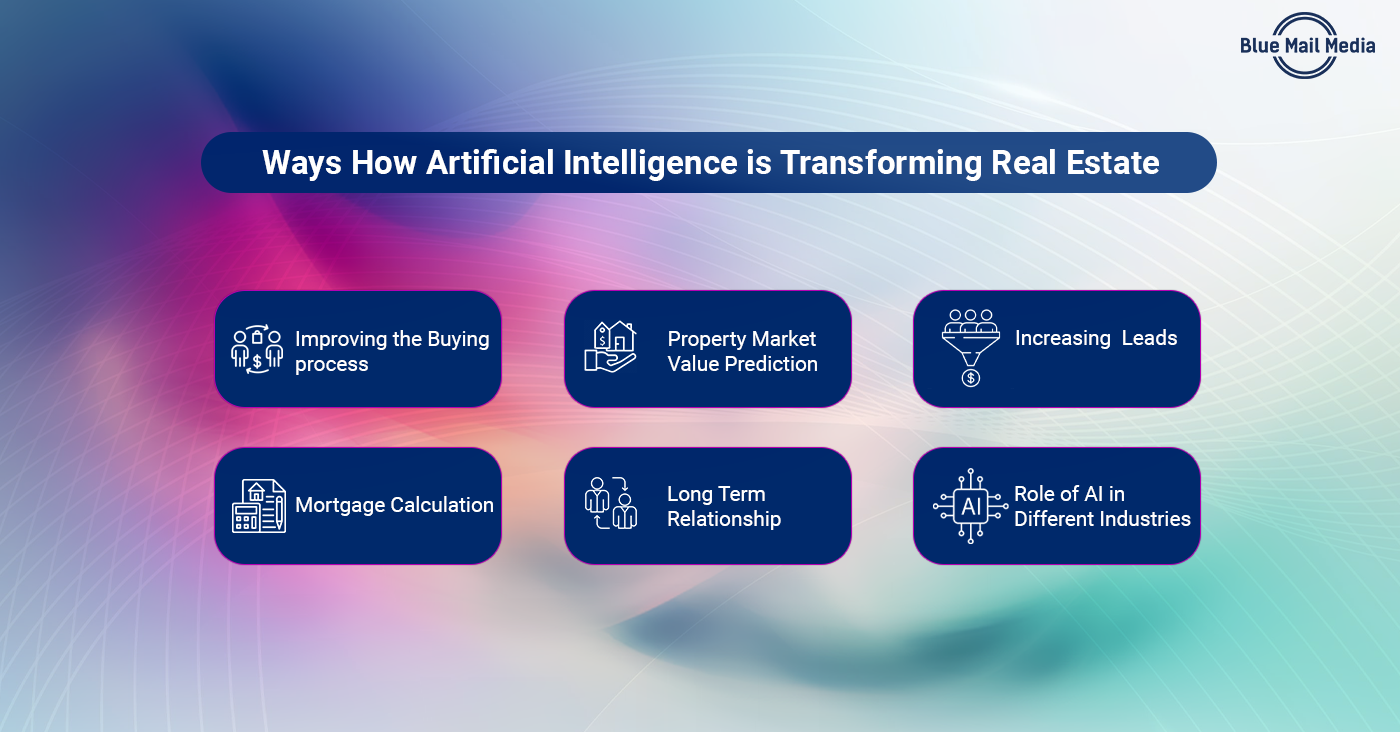Artificial Intelligence has undergone colossal amounts of evolution in the last decade and has now branched out to almost every existing industry. From self-driving cars to cancer-cell detection, AI has absolutely taken the world by storm.
The same can be said for the duo of real estate and artificial intelligence, with the total spending on AI by the real estate sector set to reach USD 1335.89 billion by 2029. With AI integrations in almost every real estate niche, around USD 97.9 billion will be spent on the technology in 2023.
So how the inclusion of artificial intelligence in real estate impacted the overall industry? Read on to find out!
Applications of Artificial Intelligence in the Real Estate Industry
With the real estate industry diverting more money and resources into AI, current spending on the technology is already 2.5 times of what the industry spent on it in 2019.
So, what investment has been made on AI offerings by the real estate industry in the last few years?
Well, read on to find out!
1. State-of-the-art Real Estate Analysis
Before settling on a real estate property, there is one question you must always ask yourself. What price should a home be purchased now in order to sell it for a profit tomorrow? Every real estate company focused on investment has this question to ask themselves?
It’s difficult to evaluate an existing property and project its future market value. Numerous variables affect the price, which may fluctuate abruptly. As a result, a realtor will find it tedious to remember every little detail. This is where AI in real estate industry can be useful.
Real estate agencies can use AI technology to give accurate and comprehensive information about a home to a client. The greater the amount of information that real estate brokers can provide to potential clients, the more likely it is that agreements will be closed.
2. AI Streamlines Property Management Processes
Here are some of the top applications of AI in real estate industry pertaining to property management processes:
- Property document generation: AI can examine papers for missing data, such as signatures, and synthesize records and documents on the basis of the information provided.
- Communications with tenant: Tenant interaction can consume a large amount of time for the property manager. Instead, an AI chatbot can respond instantly to tenant inquiries and decide whether these inquiries require the interest of the property manager.
- Landlord accounting: Maintaining track of transactions, invoices, receipts, etc., leaves a lot of room for manual error. An AI enabled property management software can handle these manual errors and can also provide digitized receipt tracking – all you have to do is scan the receipt, and the software will save it for later use.
- Reminders: AI can assist in sending automatic reminders to tenants when their rental agreement is about to expire or rent payment is due.
3. Advanced Real Estate Lead Generation
Real estate agents struggle to generate verified prospective leads for all of their listings. They frequently end up wasting several hours on meetings with non-convertible prospects.
AI now helps real estate agents completely avoid cold leads and other conduits of resource wastage.
Based on all the data AI collects from digital advertising, landing pages, website visits, etc., it determines and filters out leads with higher conversion probability.
4. Improved Quality of House Search and Recommendation
House-hunting apps employ complex search filters such as location, price, number of bedrooms, size, etc. However, searching for a house that fits all of the prospect’s requirements is an even more complex process. There is still an inadequacy of filters; it is still difficult to select a home.
Inclusion of AI in real estate can assist prospects in making appropriate decisions by reducing their search to limited and crucial criteria. It assesses your real estate preferences and present you with the best possible choices.
Artificial intelligence in real estate integrates public data with already-existing market data to profile a property listing, including:
- Light sources
- Purchasing trends
- Crime rates
- Sound disturbance
- Transportation means
- Schools
- Future projects in the surrounding area, and so on.
5. Immersive Virtual Real Estate Tours
The covid-19 pandemic hindered global travel, and the real estate sector suffered greatly as a result. It was compelled to incorporate AI technology in order to remain in business. Consequently, virtual tours were introduced and are a recent technical advancement in the world of real estate.
Thanks to AI-powered technologies, clients can experience 3D views of houses without ever leaving their homes. Some of its offerings include spoken notes, zoom-in, panorama view capabilities, and so on. This is useful, specifically for houses situated abroad or under construction. Homeowners and residents can also hold frequent meetings without physically meeting.
Challenges Faced by AI in Real Estate
Although AI adoption in the real estate industry has gone smoothly, it is needless to say that it has hit a couple of snags as well. In fact, here is a list of prominent pain points that have come up with the adoption of artificial intelligence in real estate:
- Need for an AI specialist: To begin with, AI works best in any industry when it can learn on its own. An artificial intelligence professional is required to set up, enabling, and designing solutions with automated learning capabilities in order to enable automated AI activities. Fortunately, this problem can be solved by a skilled team of specialists!
- Compliance with security and privacy policies: AI tools must be used in accordance with the international data security and privacy laws, with data security as a primary priority. One of the arduous tasks in real estate is data protection from hackers. It is a great responsibility to handle the confidential data of countless real estate clients. However, several AI experts are developing novel approaches to data security against cybercrime.
- Scarcity of data: Scarcity of data is another significant barrier hindering the smooth integration of artificial intelligence in the real estate market. The quality of artificial intelligence algorithms is heavily dependent on the data they acquire and utilize to generate sufficient output. Having both high-quality and large amounts of data allows AI software to make smarter conclusions. The fundamental issue emerges whenever the accessible data collections are insufficiently diversified.
Real Estate Tech Companies Are Currently Redefining the Market
Here is a list of organizations who are coming up or have come up with AI-based solutions for the real estate industry:
1. Silverwork Solutions
Artificial intelligence is being used by Silverwork Solutions for the development of cognitive technologies within the mortgage industry. Its solutions include software bots, which complement human labor and allow for automation that can help to deal with repetitive tasks.
2. Hyro
Hyro is building a real estate artificial intelligence tool with a conversational nature that can be used in real estate. If live agents aren’t available, AI chat and voice interfaces can be made available to customers. They can help customers find properties, schedule viewings, capture and follow up leads, and answer customer questions based on reliable information.
3. Entera
Entera is introducing a residential real estate investment platform leveraging artificial intelligence. The platform allows for automation and intelligent analytics in the identification, purchase, or operation of Single Family homes for its customers.
4. HouseCanary 
HouseCanary, powered by machine learning, provides the ultimate clarity of technology and products for home seekers. The company offers customers a wide range of resources, information, and updates to help them understand the properties they are interested in.
Wrapping Up
In a number of industries, artificial intelligence is revolutionizing the way our everyday lives are conducted, and the same goes for real estate. In order to reduce the stress of everyday business activities, AI in real estate industry enables businesses to free up their time and resources by outsourcing and automating complex tasks that require a great deal of effort.
Although the technology is still evolving, and it does have its pitfalls; for instance, compliance issues, scarcity of data, need for a professional, and so on. However, the state of the art technology can still resolve a lot of pain points such as streamlining workflows, better lead generation, etc.
So, if you haven’t yet, you need to introduce AI to your everyday work processes in order to boost productivity, efficiency, and overall success rate of your business!





